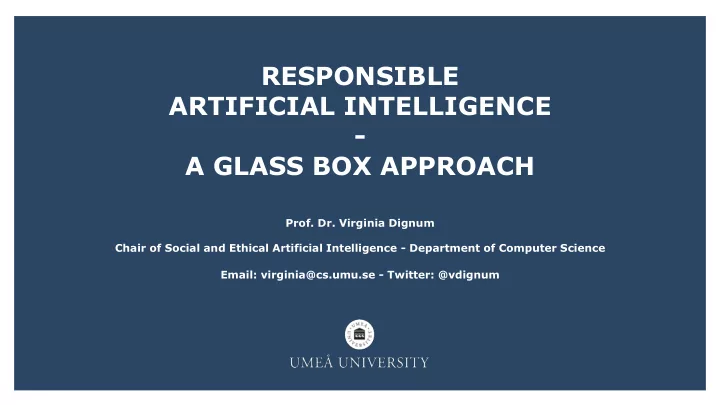

RESPONSIBLE ARTIFICIAL INTELLIGENCE - A GLASS BOX APPROACH Prof. Dr. Virginia Dignum Chair of Social and Ethical Artificial Intelligence - Department of Computer Science Email: virginia@cs.umu.se - Twitter: @vdignum
RESPONSIBLE AI: WHY CARE? • AI systems act autonomously in our world • Eventually, AI systems will make better decisions than humans AI is designed, is an artefact • We need to sure that the purpose put into the machine is the purpose which we really want Norbert Wiener, 1960 (Stuart Russell) King Midas, c540 BCE
TAKING RESPONSIBILITY • Responsiblity / Ethics in Design o Ensuring that development processes take into account ethical and societal implications of AI as it integrates and replaces traditional systems and social structures • Responsibility /Ethics by Design o Integration of ethical abilities as part of the behaviour of artificial autonomous systems • Responsibility /Ethics for Design(ers) o Research integrity of researchers and manufacturers, and certification mechanisms
TAKING RESPONSIBILITY • Responsiblity / Ethics in Design o Ensuring that development processes take into account ethical and societal implications of AI as it integrates and replaces traditional systems and social structures • Responsibility /Ethics by Design Can we guarantee that behaviour is ethical? o Integration of ethical abilities as part of the behaviour of artificial autonomous systems • Responsibility /Ethics for Design(ers) o Research integrity of researchers and manufacturers, and certification mechanisms
ETHICS BY DESIGN Can AI artefacts be build to be verifiably ethical? • What does that mean? • What is needed? • • Which values? • Whose values? • Which ethical rules? • Which interpretation?
VALUES IN CONTEXT Fairness? Fairness? Fairness?
DECISIONS MATTER! fairness values interpretation Equal Equal … norms resources opportunity concretization … … functionalities Design for Values
DECISIONS MATTER! safety values interpretation … Limit Ensure norms speed crash-worthiness concretization … functionalities Design for Values
GUIDELINES – BE OPEN AND EXPLICIT Question your options and choices • Motivate your choices • • Document your choices and options • Compliance External monitoring and control o Norms and institutions o • Engineering principles for policy Analyze – synthetize – evaluate - repeat o https://medium.com/@virginiadignum/on-bias-black-boxes- and-the-quest-for-transparency-in-artificial-intelligence- bcde64f59f5b
ASK YOURSELF • Who will be affected? • What are the decision criteria we are optimising for? • How are these criteria justified? • Are these justifications acceptable in the context we are designing for? • How are we training our algorithm? o Does training data resemble the context of use? IEEE standard Algorithmic bias https://standards.ieee.org/project/7003.html
ALGORITHMS - THE BLACK BOX? input output
GOVERNANCE - THE GLASS BOX input output
GOVERNANCE - THE GLASS BOX Fairness Equal opportunity Minimize pre- existing bias output input
GOVERN AND VERIFY - GLASS BOXES • Verify limits to action and decision • Define the ethical borders compliance o Formal Principles o Monitoring input – output compliance • Governance compliance Principles o Monitor o “block” undesirable in out Principles
EXAMPLE - FAIRNESS • Value: Fairness Dutch Law • Norm: Equal opportunity compliance • Implementation: University Employment o Output evaluation Agreements (1) P(job | female) = P(job | male) compliance • Governance Equal-opp o Cut-off o Flag-out (1)
extending (TC King et al, AAMAS 2015) GOVERNANCE TRANSPARENCY We can also check consistency of institutions!
RESPONSIBLE DESIGN – ART OF AI • Principles for Responsible AI = ART o A ccountability Explanation and justification Design for values o R esponsibility Autonomy Chain of responsible actors o T ransparency Data and processes Algorithms
https://medium.com/@virginiadignum/on-bias- black-boxes-and-the-quest-for-transparency-in- ART METHODOLOGY artificial-intelligence-bcde64f59f5b • Socially accepted o Participatory • Ethically acceptable o Ethical theories and human values • Legally allowed o Laws and regulations • Engineering principles o Cycle: Analyse – synthetize – evaluate – repeat o Report: Identify, Motivate, Document
TAKE AWAY MESSAGE • AI influences and is influenced by our Center for Responsible AI @Umeå social systems • Design in never value-neutral A research institute dedicated to develop AI systems that meet their • Society shapes and is shaped by design social responsibility: o The AI systems we develop - Understand social implications o The processes we follow - Develop theories, models and tools o The institutions we establish for oversight, accountability and • Openness and explicitness are key! verification - Methods to design, measure and o Accountability, Responsibility, Transparency audit social implications • AI systems are artefacts built by us for our own purposes http://people.cs.umu.se/virginia • We set the limits We are hiring!!
Recommend
More recommend